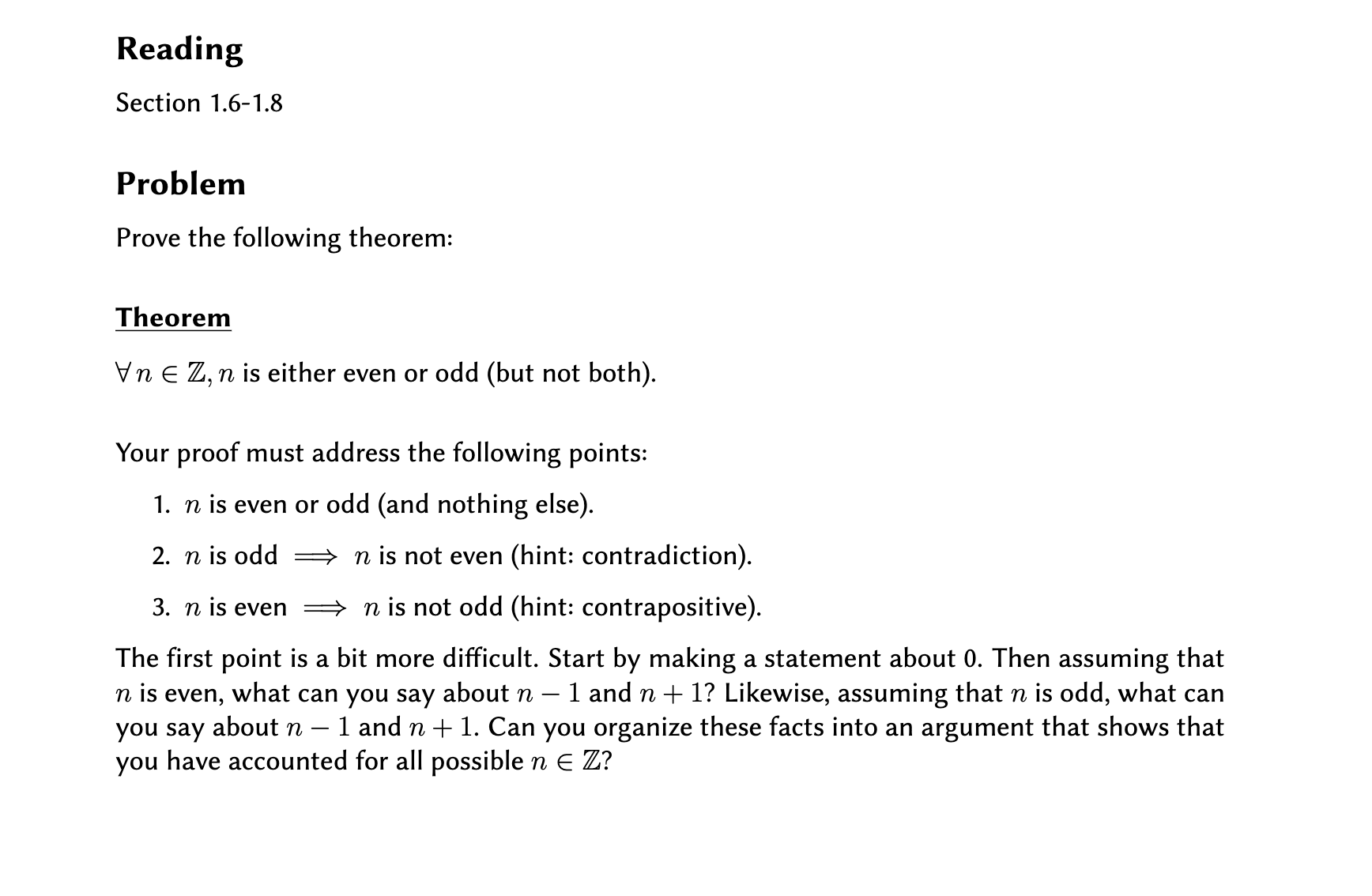Reading Section 1.6-1.8 Problem Prove the following theorem: Theorem Vn E Z, n is either even or odd (but not both). Your proof must address the following points: 1. n is even or odd (and nothing else). 2. n is odd = n is not even (hint: contradiction). 3. n is even → n is not odd (hint: contrapositive). The first point is a bit more difficult. Start by making a statement about 0. Then assuming that n is even, what can you say about n – 1 and n + 1? Likewise, assuming that n is odd, what can - 1 and n + 1. Can you organize these facts into an argument that shows that you say about n you have accounted for all possible n E Z?
Reading Section 1.6-1.8 Problem Prove the following theorem: Theorem Vn E Z, n is either even or odd (but not both). Your proof must address the following points: 1. n is even or odd (and nothing else). 2. n is odd = n is not even (hint: contradiction). 3. n is even → n is not odd (hint: contrapositive). The first point is a bit more difficult. Start by making a statement about 0. Then assuming that n is even, what can you say about n – 1 and n + 1? Likewise, assuming that n is odd, what can - 1 and n + 1. Can you organize these facts into an argument that shows that you say about n you have accounted for all possible n E Z?
Linear Algebra: A Modern Introduction
4th Edition
ISBN:9781285463247
Author:David Poole
Publisher:David Poole
Chapter2: Systems Of Linear Equations
Section2.4: Applications
Problem 32EQ
Related questions
Question

Transcribed Image Text:Reading
Section 1.6-1.8
Problem
Prove the following theorem:
Theorem
Vn E Z, n is either even or odd (but not both).
Your proof must address the following points:
1. n is even or odd (and nothing else).
2. n is odd =
n is not even (hint: contradiction).
3. n is even
→ n is not odd (hint: contrapositive).
The first point is a bit more difficult. Start by making a statement about 0. Then assuming that
n is even, what can you say about n – 1 and n + 1? Likewise, assuming that n is odd, what can
- 1 and n + 1. Can you organize these facts into an argument that shows that
you say about n
you have accounted for all possible n E Z?
Expert Solution
This question has been solved!
Explore an expertly crafted, step-by-step solution for a thorough understanding of key concepts.
This is a popular solution!
Trending now
This is a popular solution!
Step by step
Solved in 3 steps with 3 images

Recommended textbooks for you

Linear Algebra: A Modern Introduction
Algebra
ISBN:
9781285463247
Author:
David Poole
Publisher:
Cengage Learning

Elements Of Modern Algebra
Algebra
ISBN:
9781285463230
Author:
Gilbert, Linda, Jimmie
Publisher:
Cengage Learning,

Algebra & Trigonometry with Analytic Geometry
Algebra
ISBN:
9781133382119
Author:
Swokowski
Publisher:
Cengage

Linear Algebra: A Modern Introduction
Algebra
ISBN:
9781285463247
Author:
David Poole
Publisher:
Cengage Learning

Elements Of Modern Algebra
Algebra
ISBN:
9781285463230
Author:
Gilbert, Linda, Jimmie
Publisher:
Cengage Learning,

Algebra & Trigonometry with Analytic Geometry
Algebra
ISBN:
9781133382119
Author:
Swokowski
Publisher:
Cengage
